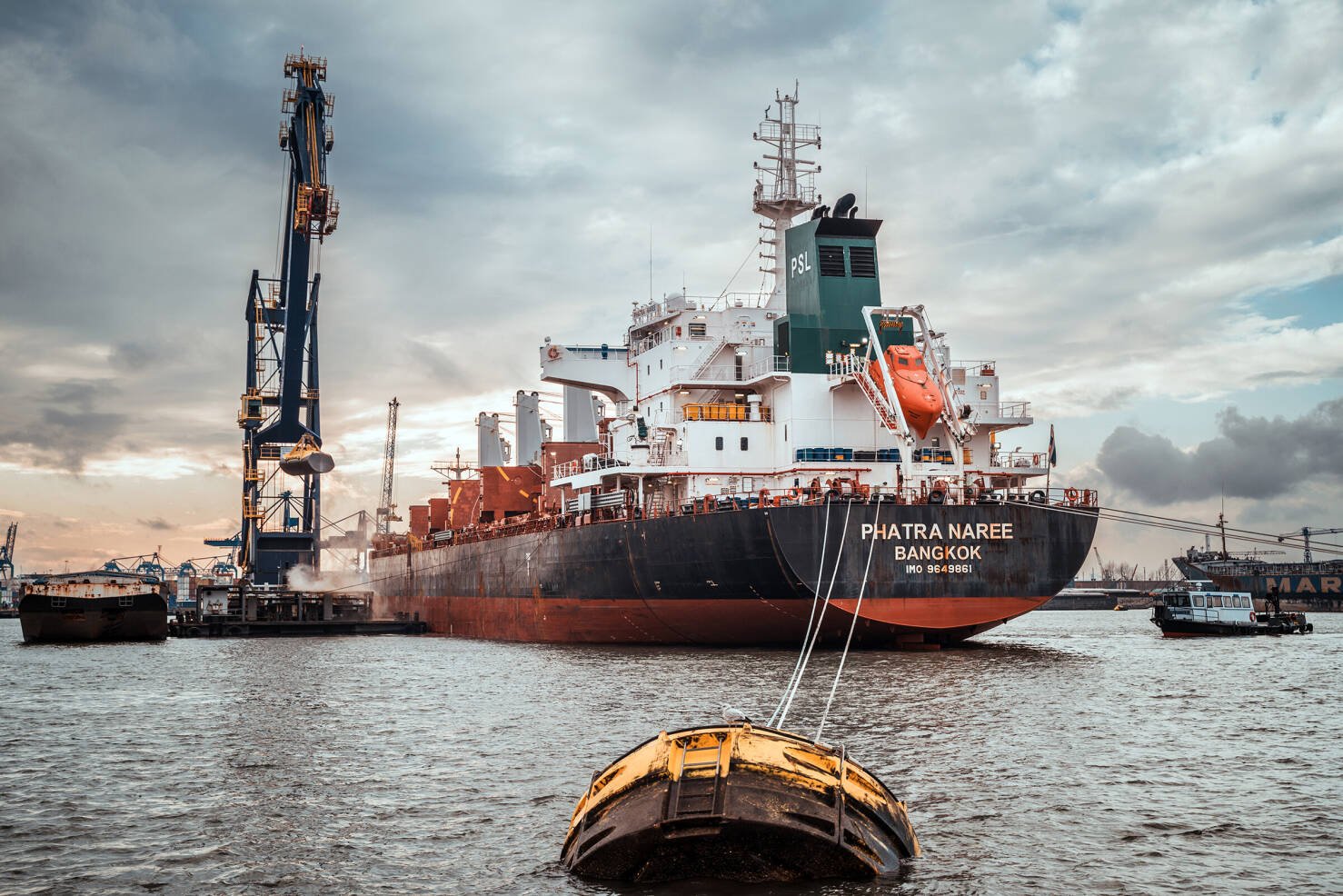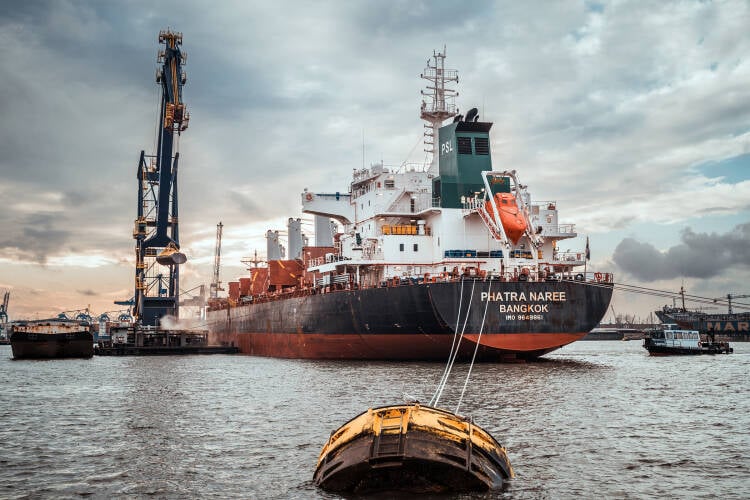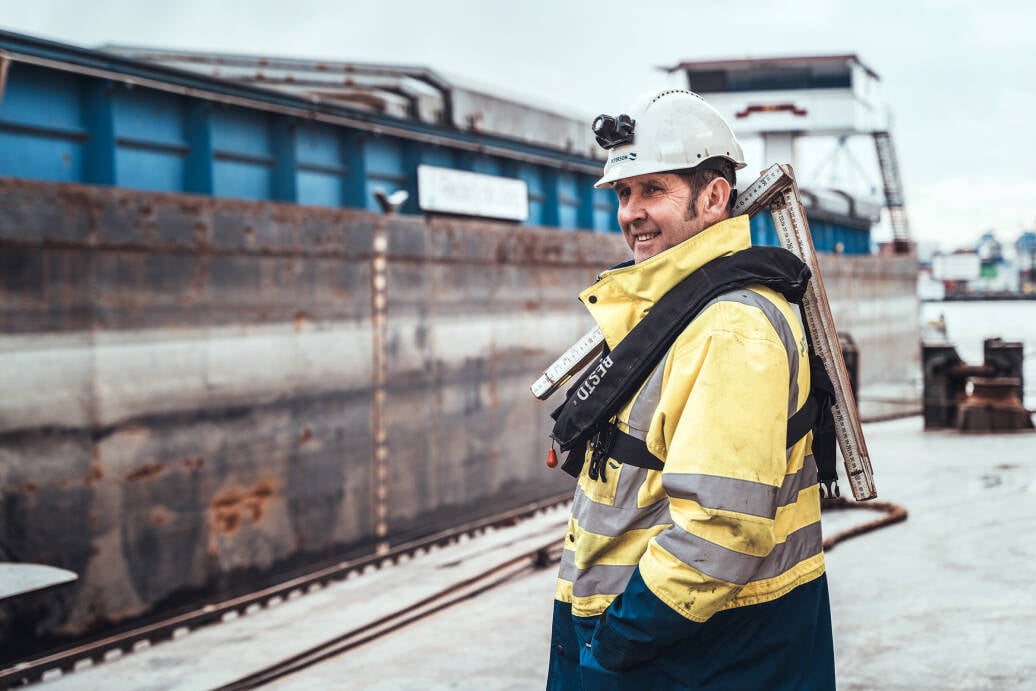'We colloquially called the first Mr Peterson P1. And so, we also have P2, P3 and P4. They are all fathers, sons and brothers.'
- Arno Mählmann, Peterson
When we ask Arno what he is most proud of, he doesn't have to think twice. Arno: ‘We play an indispensable role in the trade chain. The people in the port and in the office are dedicated to fulfilling this role. At Peterson, we’re given a lot of space to do our work properly. It's a lovely place to work. But this work would not be possible without our client’s trust. We want to take care of everything for them so that they don’t have to worry about a thing. We let them know whether the product is good or not. We ensure our clients can get a good night’s sleep – and that’s brilliant.’
Indispensable role in the chain
We wonder how you become an inspector. Arno: ‘There’s no specific training for inspectors. We train our employees ourselves. They receive training and courses on procedures, materials, safety and product knowledge. It’s important they understand how critical their role is in the supply chain. They are people who do not have a nine-to-five mentality. It's not an office job – you're actually in the port. That can be the best thing there is, but you must be able to cope with working there in temperatures of 2 to 3 degrees, surrounded by cold steel and rotating cranes. You do need to have a certain blood type, a certain DNA. Fortunately, we still have that.’
A certain blood type
I assume the method of inspection has changed throughout the years? According to Arno, that’s not the case. He explains: ‘The nice thing is that the work is still the same. Of course, technological innovations have led to better, smarter and faster methods. We can now determine many more details using various devices, microscopes and analysis equipment. But the check itself still takes place in the port. The inspector still climbs aboard the barge, takes a sample with a scoop, and uses his nose and eyes. He collects the material, such as grains or biomass, and takes it to the laboratory for analysis. The inspector may use more resources than before, but the scoop is essentially still the same.’


The clients’ eyes and ears
Many of Peterson’s clients have been with them for many years. The business started more than 100 years ago as an inspection company in the grain trade. Arno: ‘We once received a call from a party that purchased grain, but they didn’t know whether the grain was any good. They asked if we could scoop out a few sample bags and check to make sure it didn't stink, didn't have any bugs crawling through it, and if it was really good grain. That was something we could do. After our analysis, we sent an errand boy to the office – because the means of communication were not like they are today – and he would let us know whether the grain was indeed of the right quality or not.‘
‘From that role, the importance of an independent auditor became clear. Therefore, someone who is not involved in the business itself, so with the purchase or sale of those goods. We were increasingly asked to provide this service and were actually the eyes and ears for clients who were in the office or perhaps even further away. What started as a grain trading company has developed into an internationally independent service provider in bulk goods, certifications and other logistics services. We have built a good reputation and have been working for the same companies for many years. And we regularly add great new clients to our portfolio.’
The same scoop
P1 to P4
Peterson is truly a family business. Arno: ‘Mr Peterson founded Peterson in 1920. Four generations of Petersons have since worked in the company. We colloquially called the first Mr Peterson P1. And so, we also have P2, P3 and P4. They are all fathers, sons and brothers.’
About Peterson
Arno says: ‘Peterson is the independent party between buyer and seller that is hired to support the sales contract. We check whether the weight, quality and condition of the goods correspond to those agreed in the contract. We work for companies that are looking for a reliable independent partner who can take samples and determine quality.’
Scroll down
For this edition of 'Behind the Scenes', Peterson Control Union welcomed us and took us into the world of the inspection services. We had the chance to observe their daily operations and spoke with Arno Mählmann, manager of the bulk minerals and biomass department. He has been working at Peterson for over 30 years now.
In the ‘Behind the Scenes’ series, we explore activities in the port of Rotterdam. We get an exclusive look at the day-to-day operations and processes of the various companies in Europe's largest port. In this edition, we delve into the world of inspection services. We join an inspector on board a vessel to inspect cargo, and we visit a laboratory. Will you join us?
Behind the scenes:
The inspection services
The quality controllers
BEHIND THE SCENES
For this edition of 'Behind the Scenes', Peterson Control Union welcomed us and took us into the world of the inspection services. We had the chance to observe their daily operations and spoke with Arno Mählmann, manager of the bulk minerals and biomass department. He has been working at Peterson for over 30 years now.
When we ask Arno what he is most proud of, he doesn't have to think twice. Arno: ‘We play an indispensable role in the trade chain. The people in the port and in the office are dedicated to fulfilling this role. At Peterson, we’re given a lot of space to do our work properly. It's a lovely place to work. But this work would not be possible without our client’s trust. We want to take care of everything for them so that they don’t have to worry about a thing. We let them know whether the product is good or not. We ensure our clients can get a good night’s sleep – and that’s brilliant.’
Indispensable role in the chain

About Peterson
Many of Peterson’s clients have been with them for many years. The business started more than 100 years ago as an inspection company in the grain trade. Arno: ‘We once received a call from a party that purchased grain, but they didn’t know whether the grain was any good. They asked if we could scoop out a few sample bags and check to make sure it didn't stink, didn't have any bugs crawling through it, and if it was really good grain. That was something we could do. After our analysis, we sent an errand boy to the office – because the means of communication were not like they are today – and he would let us know whether the grain was indeed of the right quality or not.‘
‘From that role, the importance of an independent auditor became clear. Therefore, someone who is not involved in the business itself, so with the purchase or sale of those goods. We were increasingly asked to provide this service and were actually the eyes and ears for clients who were in the office or perhaps even further away. What started as a grain trading company has developed into an internationally independent service provider in bulk goods, certifications and other logistics services. We have built a good reputation and have been working for the same companies for many years. And we regularly add great new clients to our portfolio.’
The clients’ eyes and ears
We wonder how you become an inspector. Arno: ‘There’s no specific training for inspectors. We train our employees ourselves. They receive training and courses on procedures, materials, safety and product knowledge. It’s important they understand how critical their role is in the supply chain. They are people who do not have a nine-to-five mentality. It's not an office job – you're actually in the port. That can be the best thing there is, but you must be able to cope with working there in temperatures of 2 to 3 degrees, surrounded by cold steel and rotating cranes. You do need to have a certain blood type, a certain DNA. Fortunately, we still have that.’
A certain blood type
I assume the method of inspection has changed throughout the years? According to Arno, that’s not the case. He explains: ‘The nice thing is that the work is still the same. Of course, technological innovations have led to better, smarter and faster methods. We can now determine many more details using various devices, microscopes and analysis equipment. But the check itself still takes place in the port. The inspector still climbs aboard the barge, takes a sample with a scoop, and uses his nose and eyes. He collects the material, such as grains or biomass, and takes it to the laboratory for analysis. The inspector may use more resources than before, but the scoop is essentially still the same.’
The same scoop
Arno says: ‘Peterson is the independent party between buyer and seller that is hired to support the sales contract. We check whether the weight, quality and condition of the goods correspond to those agreed in the contract. We work for companies that are looking for a reliable independent partner who can take samples and determine quality.’

'We colloquially called the first Mr Peterson P1. And so, we also have P2, P3 and P4. They are all fathers, sons and brothers.'
- Arno Mählmann, Peterson
Peterson is truly a family business. Arno: ‘Mr Peterson founded Peterson in 1920. Four generations of Petersons have since worked in the company. We colloquially called the first Mr Peterson P1. And so, we also have P2, P3 and P4. They are all fathers, sons and brothers.’
P1 to P4
In the ‘Behind the Scenes’ series, we explore activities in the port of Rotterdam. We get an exclusive look at the day-to-day operations and processes of the various companies in Europe's largest port. In this edition, we delve into the world of inspection services. We join an inspector on board a vessel to inspect cargo, and we visit a laboratory. Will you join us?
BEHIND THE SCENES